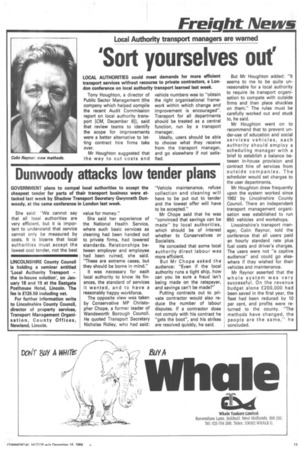Local Authority transport managers are warned
Page 15

If you've noticed an error in this article please click here to report it so we can fix it.
'Sort yourselves out'
LOCAL AUTHORITIES could meet demands for more efficient transport services without recourse to private contractors, a London conference on local authority transport learned last week.
Tony Houghton, a director of Public Sector Management (the company which helped compile the recent Audit Commission report on local authority transport [CM, December 8]), said that review teams to identify the scope for improvements were a better alternative to letting contract hire firms take over.
Mr Houghton suggested that the way to cut costs and vehicle numbers was to "obtain the right organisational framework within which change and improvement is encouraged". Transport for all departments should be treated as a central function, run by a transport manager.
Ideally, users should be able to choose what they receive from the transport manager, and go elsewhere if not satisfied. But Mr Houghton added: "It seems to me to be quite unreasonable for a local authority to require its transport organisation to compete with outside firms and then place shackles on them." The rules must be carefully worked out and stuck to, he said.
Mr Houghton went on to recommend that to prevent under-use of education and social services vehicles, each authority should employ a scheduling manager with a brief to establish a balance between in-house provision and contract hire of services from outside companies. The scheduler would set charges to the user departments.
Mr Houghton drew frequently upon the system worked since 1982 by Lincolnshire County Council. There an independent transport management organisation was established to run 850 vehicles and workshops.
Lincolnshire's transport manager, Colin Raynor, told the conference that all users paid an hourly standard rate plus fuel costs and driver's charges. The users were not "a captive audience" and could go elsewhere if they wished for their vehicles and maintenance.
Mr Raynor asserted that the whole system was very successful. On the revenue budget alone £200,000 had been saved in the first year, the fleet had been reduced by 10 per cent, and profits were returned to the county. "The methods have changed, the people are the same," he concluded.












































































